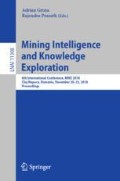Abstract
A category as well as a model is a mixture of graphical information and algebraic operations. Therefore, category language seems to be the most general to describe the models. It can provide us with the features that must characterize both the DSL language and the Modeling Method concept.
The theory of categories works with patterns or forms in which each of these forms describe different aspects of the real world. Category theory offers both, a language, and a lot of conceptual tools to efficiently handle models.
An important aspect of modeling is building complex functions from a given set of simple functions, using different operations on functions such as composition and repeat composition. Category theory is exactly the right algebra for such constructions.
The category theory creates the premises for the development of intelligent workflow modeling tools equipped with advanced analysis tools and automated learning mechanisms adapted to analyze and improve processes. The model allows on-line process information extraction, automatic learning from these data and self-improvement.
Access this chapter
Tax calculation will be finalised at checkout
Purchases are for personal use only
References
Karagiannis, D., Kühn, H.: Metamodelling platforms. In: Bauknecht, K., Tjoa, A.M., Quirchmayr, G. (eds.) EC-Web 2002. LNCS, vol. 2455, p. 182. Springer, Heidelberg (2002). https://doi.org/10.1007/3-540-45705-4_19
Karagiannis, D., Visic, N.: Next generation of modelling platforms. In: Grabis, J., Kirikova, M. (eds.) BIR 2011. LNBIP, vol. 90, pp. 19–28. Springer, Heidelberg (2011). https://doi.org/10.1007/978-3-642-24511-4_2
Karagiannis, D., Mayr, H.C., Mylopoulos, J.: Domain-Specific Conceptual Modeling Concepts, Methods and Tools. Springer, Switzerland (2016). https://doi.org/10.1007/978-3-319-39417-6
Karagiannis, D., Junginger, S., Strobl, R.: Introduction to business process management systems concepts. In: Scholz-Reiter, B., Stickel, E. (eds.) Business Process Modelling. Springer, Heidelberg (1996). https://doi.org/10.1007/978-3-642-80317-8_5
Manes, E.G., Arbib, M.A.: Algebraic Approaches to Program Semantics. Springer, New York (1986). https://doi.org/10.1007/978-1-4612-4962-7
Fowler, M., Parsons, R.: Domain Specific Languages, 1st edn. Addison-Wesley Longman, Amsterdam (2010)
Barr, M., Wells, C.: Category Theory For Computing Science- Reprints in Theory and Applications of Categories, No. 22 (2012)
Barr, M., Wells, C.: Toposes, Triples and Theories, November 2002
Walters, R.F.C.: Categories and Computer Science, Cambridge Texts in Computer Science. In: Cooke, D.J. (ed.) Loughborough University (2006)
Weske, M.: Business Process Management - Concepts, Languages, Architectures, 2nd Edn., pp. I–XV, 1–403. Springer, Heidelberg (2012). https://doi.org/10.1007/978-3-642-28616-2, ISBN 978-3-642-28615-5. (2012)
Glynn, W.: Topics in Concurrency Lecture Notes, April 2009
van der Aalst, W.M.P.: Process Mining Discovery, Conformance and Enhancement of Business Processes. Springer, Heidelberg (2011). https://doi.org/10.1007/978-3-642-19345-3
van der Aalst, W.M.P., van Hee, K.M.: Workflow Management: Models, Methods, and Systems. MIT press, Cambridge (2004)
Author information
Authors and Affiliations
Corresponding author
Editor information
Editors and Affiliations
Rights and permissions
Copyright information
© 2018 Springer Nature Switzerland AG
About this paper
Cite this paper
Crăciunean, DC., Karagiannis, D. (2018). Categorical Modeling Method of Intelligent WorkFlow. In: Groza, A., Prasath, R. (eds) Mining Intelligence and Knowledge Exploration. MIKE 2018. Lecture Notes in Computer Science(), vol 11308. Springer, Cham. https://doi.org/10.1007/978-3-030-05918-7_11
Download citation
DOI: https://doi.org/10.1007/978-3-030-05918-7_11
Published:
Publisher Name: Springer, Cham
Print ISBN: 978-3-030-05917-0
Online ISBN: 978-3-030-05918-7
eBook Packages: Computer ScienceComputer Science (R0)

